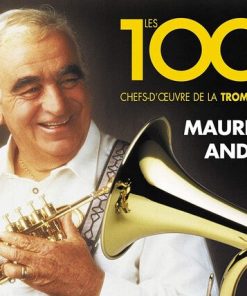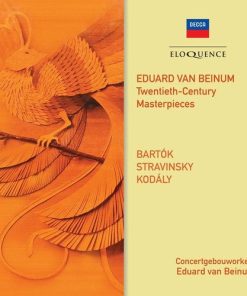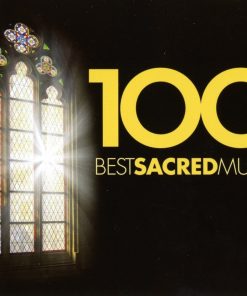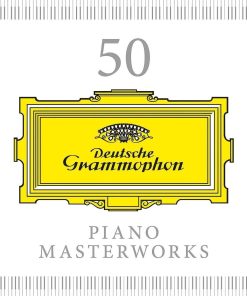BERLIOZ REDISCOVERED – JOHN ELIOT GARDINER (8 CDS + 1 DVD) DECCA
$ 37,99 $ 22,79

The Orchestre Revolutionnaire et Romantique under the leadership of John Eliot Gardiner exemplifies the highest level of quality of period instrument performance practice to this day. John Eliot and his orchestra remain the leading internationally recognised interpreters of Berlioz’ works with their performances vividly presenting the composer’s delight in complex rhythmic interplay, and their period instruments revealing a much wider range of sonorities, creating a sense of freshness and discovery. Brought together for the first time for the 150th anniversary of the Berlioz’ death, Decca presents this 8CD+1DVD original jacket set of the ground-breaking Philips recordings. Includes the world premiere recording and Grammy® Award-winning Messe solenelle alongside the key orchestral works Symphonie Fantastique, Harold in Italy and the “dramatic symphony” Roméo et Juliette and the “dramatic legend” La Damnation de Faust. The set is accompanied by performances on DVD of Symphonie Fantastique (from the same hall in which it was premiered in 1830) and the Messe solennelle from Westminster Cathedral 1992 (the first performance of this large-scale Mass for 150 years).

. . . [an] outstanding “period instrument” version. The word that comes to mind repeatedly during the driven but crisply articulate first two movements is “dashing”. Gardiner is excellent at long crescendos: well controlled build-ups, then the emotion boiling over at the climax. It isn’t just in the big outpourings of feeling that he scores: at the beginning of the central lonely pastorale, the flavoursome 19th-century French oboe and cor anglais are two voices calling to each other across wide spaces, in the background a sense of growing unease. Discomfort and deliciously grotesque orchestral colouring grow splendidly during the “March to the Scaffold”. The finale is a sinister spine-tingler . . . BBC MUSIC MAGAZINE on Symphonie fantastique
“Gardiner’s Symphonie fantastique is of endless fascination and enjoyment … he brings out the daring originality of Berlioz’s visionary inspiration and draws hugely spirited, yet refined playing from his period- instrument band. Exemplary sound and balance, too.” GRAMOPHONE

Berlioz: Messe solennelle
Orchestre Révolutionnaire et Romantique, The Monteverdi Choir
Sir John Eliot Gardiner
Berlioz: Irlande: mélodies irlandaises (9 songs), Op. 2 H38
April Cantelo (soprano), Helen Watts (contralto), Robert Tear (tenor), Richard Salter (baritone), Viola Tunnard (piano)
Sir John Eliot Gardiner
Berlioz: Le Trébuchet, Op. 13 No. 3
April Cantelo (soprano), Helen Watts (contralto), Viola Tunnard (piano)
Sir John Eliot Gardiner
Berlioz: La Mort d’Ophélie
April Cantelo (soprano), Viola Tunnard (piano)
Sir John Eliot Gardiner
Berlioz: Huit Scènes de Faust: Chant de la fête de Pâques
Robert Tear (tenor), Viola Tunnard (piano)
Monteverdi Choir
Sir John Eliot Gardiner
Berlioz: Symphonie fantastique, Op. 14
Orchestre Révolutionnaire et Romantique, The Monteverdi Choir
Sir John Eliot Gardiner
Berlioz: Harold en Italie, Op. 16
Gérard Caussé (viola)
Orchestre Révolutionnaire et Romantique, The Monteverdi Choir
Sir John Eliot Gardiner
Berlioz: Tristia, Op. 18
Orchestre Révolutionnaire et Romantique, The Monteverdi Choir
Sir John Eliot Gardiner
Berlioz: Roméo et Juliette, Op. 17
Catherine Robbin (mezzo), Jean-Paul Fouchécourt (tenor), Gilles Cachemaille (baritone)
Orchestre Révolutionnaire et Romantique, The Monteverdi Choir
Sir John Eliot Gardiner
Berlioz: La Damnation de Faust, Op. 24
Michael Myers (tenor), Anne Sofie von Otter (mezzo), Jean-Philippe Lafont (baritone)
Orchestre de l’Opéra de Lyon
Sir John Eliot Gardiner
Fast Shipping and Professional Packing
Due to our longstanding partnership with UPS FedEx DHL and other leading international carriers, we are able to provide a range of shipping options. Our warehouse staff are highly trained to pack your goods exactly according to the specifications that we supply. Your goods will undergo a thorough examination and will be safely packaged prior to being sent out. Everyday we deliver hundreds of packages to our customers from all over the world. This is an indication of our dedication to being the largest online retailer worldwide. Warehouses and distribution centers can be located in Europe as well as the USA.
Orders with more than 1 item are assigned processing periods for each item.
Before shipment, all ordered products will be thoroughly inspected. Today, most orders will be shipped within 48 hours. The estimated delivery time is between 3-7 days.
Returns
The stock is constantly changing. It's not entirely managed by us since we are involved with multiple parties such as the factory and our storage. The actual stock can fluctuate at any time. Please understand it may happen that your order will be out of stock when the order is placed.
Our policy is valid for 30 days. If you haven't received your product within 30 days, we're not able to issue either a return or exchange.
You are able to return a product if it is unused and in the same condition when you received it. It must also still remain in the original packaging.





















































